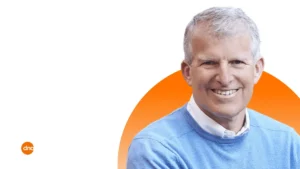Building A Better Business with Dissent, Mistakes and Unpleasant Speech
Does challenging the norm, making mistakes, and embracing uncomfortable conversations truly ignite business growth? Join us in this thought-provoking episode as we delve deep into the insights of Jonathan Berk, the A.P. Giannini Professor of Finance at Stanford GSB. Discover the transformative potential of dissent and challenging assumptions as the driving force behind thriving organizations.
Uncover why the most groundbreaking ideas often emerge from those who go against the grain. Learn the critical importance of safeguarding and valuing unpleasant speech at every level, recognizing its unique potential to unlock growth and progress. It’s time to shift away from ostracizing those who speak out and instead move towards embracing their valuable contributions!
Episode Guest

Jonathan B. Berk is the A.P. Giannini Professor of Finance at the Stanford Graduate School of Business.
His research covers a broad range of topics in finance, including delegated money management, the pricing of financial assets, valuing a firm’s growth potential; the capital structure.
Jonathan is the author of the books Fundamentals in Corporate Finance and Corporate Finance. Jonathan has received numerous awards, and he was recently awarded the fifth Stephen A. Ross Prize for the Advancement of Research in Financial Economics. In his personal life he enjoys skiing with his family. You can connect with Jonathan on LinkedIn or Facebook.
Podcast Host

Stuart Paap is laser focused on helping more people unlock brilliant and bold ideas. He works with pioneering biotechs and healthcare companies, and regularly presents at universities and tech incubators like the Harvard Innovation Lab. He’s also a former stand-up comedian and is a yellow belt in Judo, which strikes fear into no one.
Podcast Transcription
Stuart Paap:
00:00
My goal with this podcast is to give you practical, tactical advice that you can use now. Whether you’re scaling a company, leading a new team or advocating for meaningful change, this show is designed to help you make a positive impact with those who count. So let’s learn together and have some fun along the way. Let’s get to it.
Today I’m thrilled to talk to Professor Jonathan Berk, who is the A.P. Giannini Professor of Finance at the Stanford Graduate School of Business. His research covers many topics including capital structure, asset pricing and labor economics. He’s published multiple articles in the American Economic Review and The Journal of Finance, co-authored two finance textbooks, and he co-hosts All Else Equal podcast, as he and his co-host explore the science and strategy of making better decisions.
How do you think of these two worlds as sort of the noble, finite data world of ones and zeros, binary data, against humans that are much more flawed or make, as I’ve heard you say in your podcast, full of mistakes or prone to make mistakes?
Jonathan Berk:
01:26
Well, first Stuart, I think it’s a very good observation. You’re right about that. And I didn’t actually tell you the final decision to leave Goldman Sachs and go back and get a PhD in finance was made because it basically is an answer to this question.
When I was at Goldman, I was naive, as we all are when we’re young, and I looked around me and I saw very, very wealthy people and I said, “Yeah, if I stayed here, I’m going to become a very wealthy person and then I’ll die wealthy. And so what would I have done?”
And I said to myself, “No, no, I want to do something where I’ve changed the world in some way.” Right? And I said, “I want to go and do financial research and have insights that will change the world.”
I think part of the reason we started the podcast is this belief that there are some knowable things. I mean, one of the things we haven’t talked about a lot, but I’m sure we will eventually, is incentives, because it’s true individuals make lots of mistakes. It’s true human behavior on an individual level can be quite erratic. But as I like to say, “Actually, human behavior is easy to predict. All you need to do is look at the incentives.” And so from that perspective, I think we’ve made a lot of progress understanding how incentives drive behavior, which drives economic activity.
Protecting Unpleasant Speech
Stuart Paap:
02:52
So one of your episodes you talk about protecting unpleasant speech. So let’s just first of all explain what unpleasant means to someone.
Jonathan Berk:
03:03
What’s a particularly unpleasant speech? It’s when somebody in the organization says, “We are not doing something well.” Every organization thinks they’re best at whatever they’re doing. When somebody says, “We are not doing something well,” nobody likes that.
And if you don’t protect that speech, I don’t mean protect them in the sense that, “Oh, you won’t be fired,” I mean protect in the sense that somebody really says, “Thank you for saying that. Let’s think about that. Are you right in saying that? Is that something we need to think about?”
Stuart Paap:
03:35
You bring up in one of your episodes the Space Shuttle Challenger that I remember seeing in 1986 there was this explosion, and I believe that the research pointed that there was a gasket seal that was the inherent problem from an engineering perspective.
Jonathan Berk:
03:52
The seal was found by Richard Feynman who was one of the greatest physicists that’s ever lived. And so the question is why was Richard Feynman the person to? He certainly didn’t have any do with building the space shuttle.
And the answer was that after the space shuttle disaster, they appointed a committee and somebody put Richard Feynman on that committee. Now, Richard Feynman was well-known to be somebody who spoke his mind, and often the way he spoke it was not necessarily pleasant.
And they intentionally put him on that committee because they knew that they needed somebody outside of NASA who was willing to speak his mind, to look carefully at what was going on, right? And I think that that’s an important lesson. That’s the kind of people you put on committees, and by doing so and by letting him speak his mind, he discovered when everyone said, “No, the seals are fine,” it was the fact that the temperature were particularly low that the seals failed.
And in typical Richard Feynman way, the way he showed that was in the Senate he dropped the seal into liquid nitrogen to show everybody what happens to the seal in a cold temperature. So it’s a great, great lesson.
Okay, back to your question. Obviously, if you wait till when the space shuttle’s on the launchpad and you start talking about the seals, there are good reasons why people are not going to listen to you.
Part of the reason why it’s impossible to agree to disagree is that if you and I have different views, if we come to a different decision, we should both be saying to ourselves, if we think we’re both fully rational, “Well, you’re fully rational, you’ve come to a decision. I’m fully rational, I’ve come to a decision. The only way those two decisions can be different is if we have different information, so therefore we should be taking into account the fact that you and I have different information. In other words, there’s something I know, something you know that I don’t know that’s of important relevance. I need to find that out.” And that’s the essence of why you can’t agree to disagree.
So when you’re on a launchpad, you have to say, “Well, look, there’s been tremendous amounts of due diligence done here. One guy says there’s a problem with the seal. It seems really unlikely that that guy has a piece of information that nobody else has. It seems much more likely this guy’s just wrong. He doesn’t know, he’s a junior guy and he doesn’t have enough information and so we should discount that.”
On the other hand, if you do it in the beginning phase where everybody’s gathering information and somebody’s thing, you take it seriously, it’s a different question. And so I think that those two are different.
You also point to another reason which is one of the biggest mistakes human beings make, is the sunk-cost fallacy. Once the costs are sunk, there’s nothing we can do about it. They should be completely beyond any decision-making. But many people, and it’s an interesting evolutionary question, why is it that human beings have this emotional need to say things like, “Well, I’ve put all this work in, I don’t want to lose it so I want to keep doing it, right?” It’s certainly a mistake. And so that is something that it’s a business mistake we shouldn’t make.
Dissenting Opinions
Stuart Paap:
07:24
So let’s just imagine that people have joined a team and said, “Okay, I’m on this team and we’re 100 people deep, it’s a 10,000 person organization, and we want to implement this dissenting opinion so that we challenge one another so that we have a better end product, better data, better product recommendations.” How can one go about that if one does not necessarily see it always coming from the top down? How do you start where you are?
Jonathan Berk:
08:01
Okay, so I’m an academic, not a practitioner, so asking me specific questions about how to run organizations, I’m probably not the world’s expert on that.
Having said that, our very first podcast had Ruth Porat, who’s the CFO of Google, and actually it won an award in the end, that podcast. And this was a question we put to her. We put it to her in terms of what about people making mistakes? And it’s the same thing.
Often if you dissent, you’re wrong, right? I mean, in general, just think of the probability. The correct answer, everybody’s going to have the same answer. An incorrect answer, there are lots of different answers. So if a lot of people are all saying the same thing, a good reason why that’s the case is because it happens to be the right thing to do. Right?
So often when you dissent, you’re making a mistake. And one important way to stop dissent is to make fun of people who make mistakes, and that I think is a very, very destructive thing to do. As I say to my students, if every single time you’re making a mistake, that’s a problem, but it’s nothing to do with that’s because you’re not good at your job. But assuming you are good at your job, then you’re still going to make mistakes. And those mistakes should not be, we shouldn’t shame people for that. Right?
And so Ruth Porat pointed out that I think, if I remember correctly, there’s some award Google gives for people for speaking out even when they’re wrong. Right? Or they explicitly encourage people for speaking out, independent of whether or not what they said was actually correct.
Another thing that she said that I thought was fascinating was in setting goals. At Google, if you achieve your goals, then they actually punish you because they say, “Look, obviously you haven’t set your goals high enough.” Right? “Because who could achieve their goals? We expect you not to. We expect you strive for more than just the status quo.”
So she described a bunch of things that Google does that are pretty innovative in terms of trying to make the organization work better. But I would say in the world of research are new ideas. The only new ideas are obviously ideas where you’re disagreeing with everybody because if you agree with everybody, you’re doing the same old thing and you’re not going to really innovate.
Incentivizing Behavior
Stuart Paap:
10:28
So you talked about two things. One, having an environment where it’s okay to speak up, and it sounds like you’ve been a benefactor of those environments throughout your career in academia. But then the other part you talked about Ruth Porat, CFO of Google and Alphabet, incentivizing behavior that will create that sort of, maybe I’m misinterpreting this because if you hit your goals, that’s sort of goal-based. Do you have thoughts or ideas around incentivizing that type of behavior?
Jonathan Berk:
11:00
I don’t think I’m the right person to ask that question. I haven’t thought about it carefully enough.
Let me say this though. I do think it’s deeply cultural. And it’s the organization can set that culture. I think that that culture is a culture that is enormously valuable in an organization, if you can have a culture where people challenge each other.
And it’s a difficult culture, and I always think about when I was on Wall Street I compared the Goldman Sachs culture to the Solomon culture. And Goldman Sachs survived and Solomon didn’t, and I think the culture was critical to that. And they always said Goldman was a team culture, “We’re a team, we all work together.” And Solomon was more individualistic. And you might think, “Well, doesn’t that mean there’ll be less ability for people to speak their mind? Because everybody has to support the team.” And I don’t think it was.
So I’m not an expert in this area and I haven’t thought about it enough, but it’s certainly something that organizations should think about carefully.
Stuart Paap:
12:36
One of the ways that I’ve seen people try to account for that is by putting people in role plays or scenarios to explore other points of view but without having to bear the brunt of taking that point of view.
So what I mean by that is let’s imagine in this situation that you and I are colleagues and peers and a product team is going to bring a new product for us. And for this role play, you’ll play the role of, “This is going to fail for these reasons,” and I have to adopt the position that, “It’s going to succeed for these reasons.” Some people call it red teaming, which comes from military history to sort of war game a certain scenario.
And so I’ve seen this be successful because people have permission to speak up but they don’t have to always wear the weight of, “That was my entire reputation and career capital in that meeting.”
Critical Analytical Thinking
Jonathan Berk:
13:33
Yeah, I think that’s an excellent way of doing things. I will say human beings are very interesting creatures and our emotions, how they rule our decision-making is very interesting.
So let me tell you a story. We used to teach a course called Critical Analytical Thinking at Stanford. And as part of that course, spent a lot of time trying to get students to understand this idea that if you’re disagreeing, it means somebody’s making a mistake. I think that that’s a important business tool. Doesn’t mean we’re not going to disagree, of course we are, but just understand, somebody is making a mistake in that group. And as I like to say to my students, “And it could be you.”
Now in that role, what I would do is I would come up with a decision that would have to be made and I would arbitrarily assign students to different positions. But the thing I noticed there, they would hold onto their positions as if it was their own to the end, even though I arbitrarily decided their positions. I mean, they had absolutely no stake in it whatsoever but once I’d done this, suddenly their emotions took over and they had a stake.
So in that red and green room environment, I think it’s a really good idea to say, “Okay, I’m just arbitrarily assigning you. Tell me why this product is bad.” At the same time, when you argue, if somebody makes an argument to you that clearly means that your argument is wrong, then that part of that exercise is to say, “Yes, that’s right.” It’s not your world, and that in no way makes you a worse person or a stupid person or anything else, it makes you a better person.
Again, I used to, when I taught that class, one of the things about Stanford at GSB is we love Navy SEALs. We have I don’t know how many Navy SEALs every year in our class. And so it was the beginning of the quarter and I had my 15 students and I knew who the Navy SEAL was, and so I don’t remember his name, but let’s say Michael.
I said, “Michael.” I was sitting there, I was going, “Michael, let me ask you a question. You commanded a troop of Navy SEALs, and when you commanded that troop, I’m sure you had to have variants of people. Some of your soldiers were very pigheaded, they refuse to ever change their mind, they knew how to do it their way, and other ones of your soldiers were much more amenable, they would change their mind, admit their mistakes. And you tell me, which one would you prefer to command?” And of course he said, “Yes, I want the second one.” And then I would look at the whole class and said, “Well, and why would you want to be the first one?”
So I think in setting those games up, you also have to have the culture of, “We’re setting this up to get the best decision.” And so we have to come into that with a will, which is we want you to vigorously defend, vigorously argue for your position, but if somebody makes an argument which clearly shows that your position is wrong, there’s nothing wrong with saying, “Yeah, okay.” And then we come to the right decision.
Stuart Paap:
16:46
What has to be there, I agree, is it has to be underpinned in a fabric of trust that ultimately you are all rowing in the same boat together, that you will celebrate the successes and you’ll pay for the misses together as a team.
Jonathan Berk:
17:11
So I get students literally the first day of their MBA. And on that first day, what I talk about is what I consider to be essentially the value of the degree, which is this idea that every decision is quantifiable. There is no such thing as a decision that isn’t quantifiable. Right? And if you think that there is, you’re just being lazy.
That doesn’t mean you may not know. You may be very uncertain of what the value of the decision is. There could be a tremendous amount of uncertainty, that’s different from it not being quantifiable, but that every decision is quantifiable, and when you quantify it, the number is either positive or negative. And if it’s positive, you should do it. And if it’s negative, you should not do it, what we call the net present value of the decision.
The idea that no, you don’t get to just make a decision from your gut. Every decision, there’s at some point a benefit and a cost, and you need to know what the trade-off between that benefit and the cost is. I’m not suggesting you do this every time, make lots of decisions our lives and the process of developing the benefits and the cost could be very costly. So I understand that you don’t want to do everything.
But from a business perspective, when you’re making a serious business decision, then it is essential in that case to quantify the decision and figure out how to do that. And to do that, it requires doing what you’re doing, which is to say, “I’m going to have benefits in the future. What is the value of those benefits today?” Because usually the costs are today and the benefits are in the future.
The number of people who make decisions in their own lives without quantifying those decisions, without sitting down and saying, “What is the benefit to me of this decision? What is the cost to me of this decision, and is that positive?” Right? It’s astonishing. Because I mean, sometimes we make very big decisions in our lives and we don’t think that way.
How to Affect Future Culture
Stuart Paap:
19:12
I love the framework of saying it’s quantifiable, you can measure it, because you’re saying there is a value to each, and I’m imagining a grid where you check a box and say, “The value of this decision.” The hardest part at times.
If there’s any hope that you have for these emerging companies that want to change the world and make an impact on it in a positive way, and they have a chance to affect future culture, what would you recommend they consider or how could they approach that?
Jonathan Berk:
19:44
You have to set up a culture where people feel free to speak their minds. You have to set up a culture where people understand that decisions are quantifiable and that you have to do things rigorously, you have to do things scientifically, you don’t make arbitrary decisions.
There’s obviously no magic bullet to how to run a great company. There’s no one unique culture. But within that culture, you have to have this ability for people to dissent, and dissent in a way that’s acceptable.
One of the things we didn’t talk about, we touched on it very, very slightly, is part of that dissent has to also not be social ostracism. That’s the easiest way to stop dissent, is to ostracize people socially. We’re social creatures, all of us want to be accepted. And so even if you say, “Oh, this organization, no harm will come, say whatever you want, blah, blah, blah,” but people go, “Oh, that guy’s such a pain in the ass. He’s always such a pain in the ass,” and you ostracize people that way, that’s also going to be destructive. It really has to be deep in the culture that this is what we value.
Stuart Paap:
20:54
Is there anything else that you’d like to share where people can go to read more or listen to more, Jonathan?
Jonathan Berk:
20:59
Going to the podcast is a very good place to start. I will say though that I’ve really enjoyed this. I mean, your questions I think are really insightful, they’re really spot on. It’s all about this idea of how to improve organizations and this idea of how do we run businesses better? And more importantly, how to communicate to people how to make better decisions.
The truth is that most people, this is not on the forefront of their minds, they don’t even think about the possibility that they can improve their decision-making. I’ve really enjoyed it.
Stuart Paap:
21:34
Jonathan Berk, thanks again for being a guest on the show, and till we see each other again.
Thanks for listening to the Stand Up to Stand Out, the Podcast. If you’re enjoying the show, I urge you to check out influenceDNA.co and find the podcast page where you can find show notes, links to the guests, extra resources and a whole lot more.
Also, you can subscribe on YouTube, Spotify, Apple Podcasts, and make sure to sign up for our mailing list. If you have questions about the show or comments about how we can improve it, drop us a line. I will read every single message. That’s [email protected].
If you like what you heard, I’d say leave us a five star review. And if you hated what you heard, leave us a six star review. Either way, we’re not stopping. See you on the next show.
Inside the Influence Lab
Episodes
Articles

Building a Strong Speak Up Culture for Business Success




Closing the Leadership Intent-Impact Gap





















